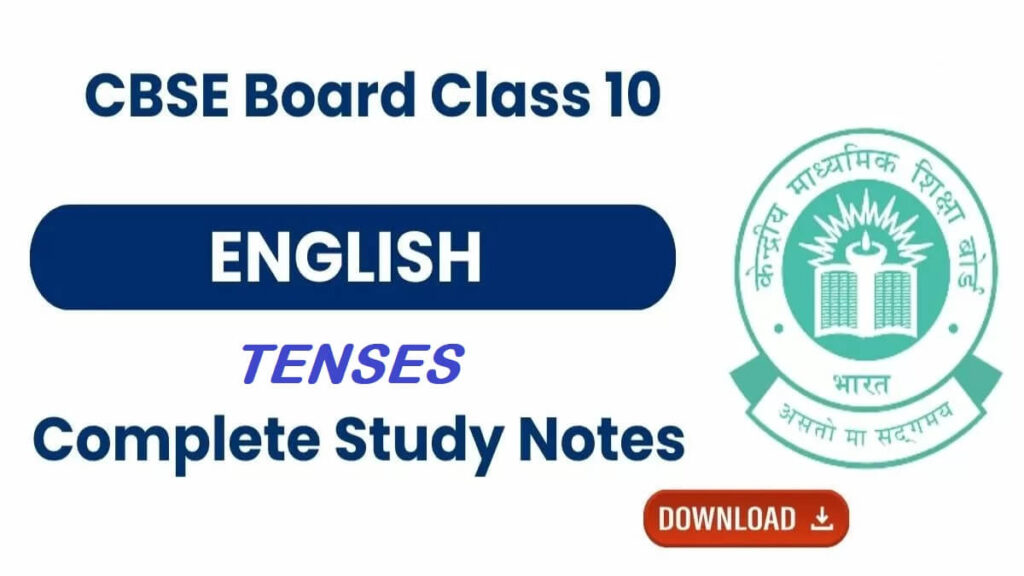Understanding tenses is crucial for mastering English grammar, especially for Class 10 students. Tenses help us express the time of an action—whether it happened in the past, is happening now, or will occur in the future. In this guide, we’ll break down all 12 tenses with clear explanations and practical examples to boost your grammar skills.
What Are Tenses?
Tenses indicate the time of an action or state of being. They are divided into three main categories:
-
Past Tense – Actions that have already happened.
-
Present Tense – Actions happening now or regularly.
-
Future Tense – Actions that will happen later.
Each of these is further divided into four subcategories: Simple, Continuous, Perfect, and Perfect Continuous, making a total of 12 tenses.
Tenses Matrix Table with Examples
| Tense | Structure | Example | Usage |
|---|---|---|---|
| Simple Present | Subject + V1 (s/es) | She writes a letter. | Habits, general truths |
| Present Continuous | Subject + is/am/are + V+ing | They are playing football. | Actions happening now |
| Present Perfect | Subject + has/have + V3 | He has finished his work. | Past actions with present effect |
| Present Perfect Cont. | Subject + has/have been + V+ing | I have been reading for hours. | Ongoing actions started in the past |
| Simple Past | Subject + V2 | She wrote a letter. | Completed past actions |
| Past Continuous | Subject + was/were + V+ing | They were playing football. | Past actions in progress |
| Past Perfect | Subject + had + V3 | He had finished his work. | Action completed before another past action |
| Past Perfect Cont. | Subject + had been + V+ing | I had been reading for hours. | Past ongoing actions before another event |
| Simple Future | Subject + will/shall + V1 | She will write a letter. | Future predictions or decisions |
| Future Continuous | Subject + will be + V+ing | They will be playing football. | Actions in progress at a future time |
| Future Perfect | Subject + will have + V3 | He will have finished his work. | Actions completed by a future time |
| Future Perfect Cont. | Subject + will have been + V+ing | I will have been reading for hours. | Duration of action up to a future point |
Why Are Tenses Important?
-
Clarity in Communication: Using the correct tense ensures your message is clear.
-
Better Writing Skills: Proper tense usage improves essays, letters, and exam answers.
-
Higher Exam Scores: Grammar sections in Class 10 board exams often test tense knowledge.
Final Tips for Mastering Tenses
✔ Practice daily with exercises and real-life examples.
✔ Read books & articles to see tenses in action.
✔ Use flashcards to memorize structures.
By mastering these 12 tenses, you’ll enhance your English fluency and writing skills significantly. Bookmark this guide for quick revision before exams!
CBSE Class 10 Tenses Handwritten Notes in English
CBSE Class 10 Tenses Handwritten Notes in Hindi
Also Read:
- CBSE Class 10 Social Science resource and development notes in PDF
- Class 10 Economics Chapter 2 Development Handwritten Notes
- Class 10 Civics Chapter 1 Power Sharing Handwritten Notes PDF
- CBSE Class 10 English Question Paper 2024 PDF
- Bholi Class 10 Question Answer I NCERT Solutions for Class 10 English
- NCERT Solutions for Class 10 Punjabi Sahitik Kirna PDF
- NCERT Class 10 Books Price List 2024
- CBSE Class 10 English Important Extra Questions with Answers
- Maths Formulas for Class 10 pdf free download
Homepage |
Click Here |
Official Website |
Click Here |
Join Whatsapp |
Click Here |

